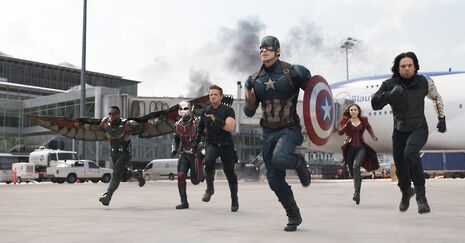Film: Captain America: Civil War
Captain America: Civil War may be the best Marvel film yet. Maybe.

There’s no other way to say this: I expected this film to be terrible. Featuring a huge cast that made it seem more like an Avengers film than a Captain America one, and following the incredibly formulaic nature of recent Marvel films, I was expecting the worst.
The film opens at the start of a mission, a selection of the Avengers are tracking down the villain Crossbones to tie up some loose ends from the previous Captain America film. It was at this point I was most worried Captain America: Civil War was only going to repeat the mistakes made in the rather disastrous The Avengers: Age of Ultron. But, aside from their startlingly similar opening sequences (although Civil War’s is much better edited), the two films couldn’t be any more different.
Taking only vague inspiration from Mark Millar and Steve McNiven’s Civil War, a comic event that took over the Marvel universe in 2006 and spanned over 80 tie-in issues, Captain America: Civil War is an amazingly focused, character driven film that treats its central conflict with respect and equal weighting. Personal opinion aside (I’m always going to be Team Iron Man), at no point is the audience forced or expected to side with either character, or either team.
Perhaps the biggest challenge for directors Joe and Anthony Russo was to divide the Avengers in a way that seemed believable, yet with stakes great enough that the divide was meaningful. The answer to this comes in the form of the Sokovia Accord. After witnessing the destruction caused by the Avengers’ superheroics, the collateral damage that results in the death of innocents, 117 countries call for the Avengers to answer to UN, or else be seen as vigilantes. Naturally, this causes a bit of a problem for the heroes.
Guilt-ridden over his creation of a murderous robot, the film builds on from Age of Ultron in the best way possible, as Robert Downey Jr’s Tony Stark sides with the government’s attempts to control the team, and make them accountable for their own actions. Captain America disagrees. But it’s in protecting his childhood best friend Bucky/Winter Soldier (Sebastian Stan) that Chris Evans’ Steve Rogers really turns against the government, and where the conflict becomes pointed. The Avengers divide, some more dramatically or more surprisingly than others, and suddenly there’s a civil war in their hands.
Captain America: Civil War isn’t too action heavy, but it also isn’t scenes of people standing around talking. It’s two and a half hours long, though it only occasionally feels like it. Like in Captain America: The Winter Soldier, the fight sequences are clean and impressive, with some great motorcycle stunts and car chases, as well as hand to hand combat scenes. Realistically, they could have cut some of this down, as it can get rather repetitive, but I suppose there are only so many different way to hit someone. And, as much as I love Emily Van Camp’s Sharon Carter, a rushed romance subplot between her and Steve definitely feels like an afterthought, and omitting it altogether would have helped with the rather hefty running time.
But on the whole, the Russo brothers juggle a huge cast without seeming to waste a single character. Tom Holland is exciting and engaging as Peter Parker and as Spider-Man, balancing the teenager’s enthusiasm and inexperience perfectly. Chadwick Boseman is stern and compassionate as Black Panther, on the hunt for revenge. But my favourite scenes involved a more domestic Paul Bettany and Elizabeth Olsen as the Vision and Scarlet Witch. What could just be cameos are made more than that, each appearance (be it the fanboy Antman or the recently retired Hawkeye) feels natural. Certainly more so than the Wonder-Woman-watches-teaser-trailers scene in Batman v Superman: Dawn of Justice.
Seeing that he’s really given very little to do, Daniel Brühl’s Zemo is understated, calculating and ultimately human. He’s about as far from the showy, robotic Ultron as you can get. His character acts more as a catalyst, than a true super-villain, but his motives were always going to be secondary in film where Captain America and Iron Man butt heads.
Captain America: Civil War is a Marvel film in the best possible sense of the word. Even the final showdown between the two teams, which looked almost small and insignificant in the trailers, is an emotional, impactful, and at times very funny scene. And that’s what the film is: a balance of character, morality, jokes, and of course, punching.
I’m aware that by reviewing this film, I am mostly pointing out the ways it is not like the previous Marvel instalment. But honestly, that’s because I can’t help but wish The Avengers: Age of Ultron had really been The Avengers: Civil War. As it is, Captain America: Civil War may be the best Marvel film yet. Maybe.
 Features / Meet the Cambridge students whose names live up to their degree9 September 2025
Features / Meet the Cambridge students whose names live up to their degree9 September 2025 News / Student group condemns Biomedical Campus for ‘endorsing pseudoscience’10 September 2025
News / Student group condemns Biomedical Campus for ‘endorsing pseudoscience’10 September 2025 News / Tompkins Table 2025: Trinity widens gap on Christ’s19 August 2025
News / Tompkins Table 2025: Trinity widens gap on Christ’s19 August 2025 News / New left-wing student society claims Corbyn support11 September 2025
News / New left-wing student society claims Corbyn support11 September 2025 Science / Who gets to stay cool in Cambridge?7 September 2025
Science / Who gets to stay cool in Cambridge?7 September 2025








